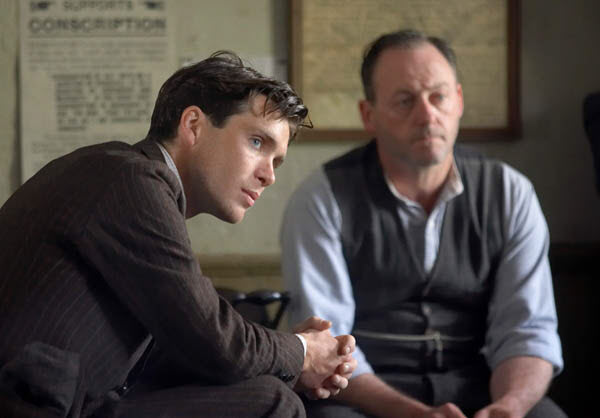Movie review by Greg Carlson
Winner of the Palme d’Or at the 2006 Cannes Film Festival, Ken Loach’s “The Wind That Shakes the Barley” continues the director’s tradition of naturalistic depictions of societal and political struggle pitting the marginalized against the powerful. A gripping indictment of unwanted military occupation and the costs of armed conflict, the movie echoes contemporary news reports without specifically functioning as an allegory for U.S. involvement in Iraq. Even so, the guerilla tactics employed by the Irish Republican Army form parallels that are hard to deny. Loach has spoken about how the past can illuminate the present, and “The Wind That Shakes the Barley” rarely feels like a period piece.
Set in the early 1920s during the lead-up to the Irish Civil War, the movie follows the actions of Damien (Cillian Murphy) and Teddy (Padraic Delaney), brothers who take up arms for the IRA in the hopes of driving the British from Ireland. Loach begins the film with a harrowing incident in which a small squad of Black and Tans harasses a group of young men. The one who defiantly answers the interrogators in Gaelic pays dearly for his pride and the episode has such a profound effect on Damien, he immediately abandons his plans to study medicine.
Working with screenwriter Paul Laverty, a frequent collaborator, Loach refuses to shy away from the fierce brutality that accompanied what surely must have been a terrifying day-to-day existence for the working class in County Cork. The horrifying acts of violence are not limited to the oppressors, however, as Damien himself begins to carry out unspeakably grim tasks. Loach’s unadorned, fly-on-the-wall approach allows scenes to unfold with raw immediacy and a tension that suggests anything might happen. Given the things he is asked to do, Damien and the audience are forced to contemplate the limits of what one might do for a cause.
Some of the best scenes in the film pause to contemplate the political deal-making that results in hard to swallow compromise. When uneasy accords are reached, brother is divided from brother over whether or not the painful struggle has been in vain. The fraternal conflict sounds like the makings of classic melodrama, and to some extent, the relationship between Damien and Teddy is played out in terms befitting a Greek tragedy. Pragmatism goes head to head with idealism, and the outcome is as black as night.
As a storyteller, Loach layers his tale with much to contemplate. To his credit, the movie resists a preachy tone. The running time occasionally slackens, but the scenes that count the most are delivered with a striking tautness and economy. Murphy, known to American audiences primarily for his work in “Red Eye” and “Batman Begins,” is outstanding as the troubled fighter. As is typical of Loach’s films, however, the entire ensemble seems to operate like a single organism, and the many supporting performers are as integral to the movie as Murphy. “The Wind That Shakes the Barley” might scare away some viewers reluctant to invest in what at first glance looks like a dour history lesson, but viewers who do opt to see it will be rewarded.
